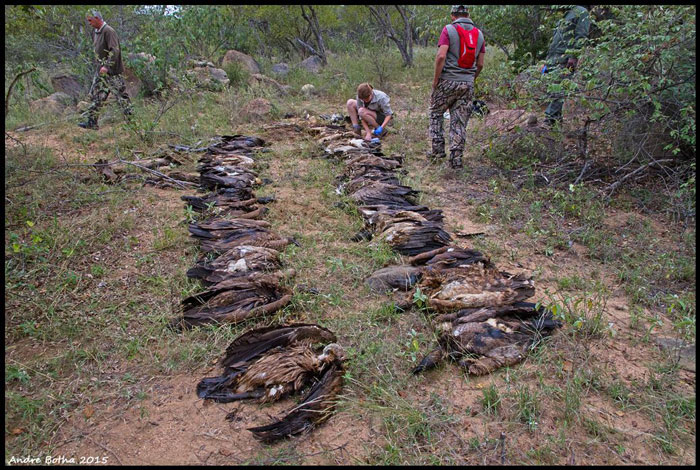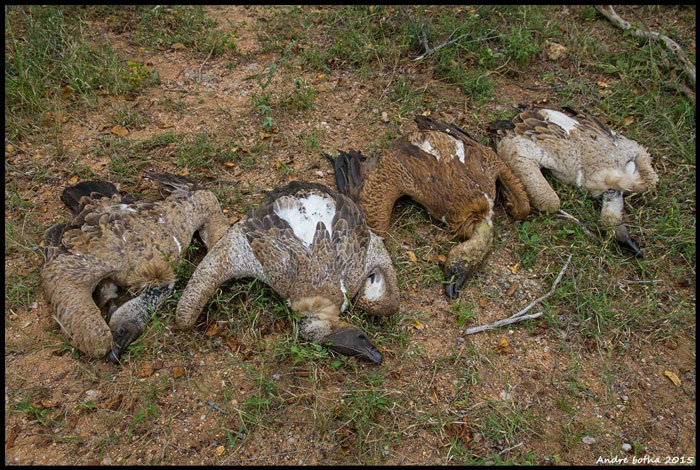We were alerted to a vulture poisoning incident on a private farm near Hoedspruit late in the afternoon on 6 May 2015. After contacting the farm manager and obtaining initial information about the incident, we met with him first thing the next morning and assessed the scene, which was secured overnight to ensure that no further exposure to mammalian, vultures or other avian scavengers would occur. The farm is located on the confluence of the Blyde and Olifants rivers. Written by Andre Botha, Manager of the Endangered Wildlife Trust‘s Birds of Prey Programme and Co-chair for the IUCN SSC Vulture Specialist Group

A total of 65 vultures of various ages and a single adult tawny eagle were found dead at various locations on the scene. This included African white-backed (globally endangered), hooded (globally endangered) and Cape (globally vulnerable, regionally endangered, near-endemic) vultures. Many of the birds were adults of breeding age, which will have severe consequences and cause the loss or break-up of several breeding pairs at this early stage of the breeding season.

During our assessment of the scene, it was obvious that the poisoning was associated with substantial meat-poaching activities. The team recovered many wire snares and found what appeared to be a camp where poachers spent some time slaughtering a range of animals. Parts of carcasses that were not removed to be sold as meat were scattered on the scene. Based on the evidence, it seems that a zebra carcass was first laced with poison which killed a first batch of birds, and this was followed up a few days later by the remains of a kudu cow that was also poisoned and that killed the remainder of the birds. The latter carcass was also cut up, and parts of it were placed in the trees, apparently a deliberate attempt to poison avian rather mammalian scavengers.


We did find signs of mammalian scavenging on some of the older carcasses, so it is likely that jackals and/or hyenas could also have been poisoned. A report of a dying jackal showing classic poisoning symptoms was received from a neighbouring farm early on Friday.

Samples for toxicological and other analyses were collected from several carcasses. We believe a chemical with acute toxicity was used as many of the dead birds still had food in their mouths when they died. A carbamate-based chemical was likely used to kill the birds. These types of chemicals are widely used in agricultural practices. Despite the same substances being banned in the last year, substantial stockpiles of these are still in circulation and available for use.

The crime scene was properly cleaned up and sterilised to prevent further poisoning of birds and other wildlife. All remains of the killed birds, poisoned carcasses, and found baits were incinerated. The Limpopo Department of Environment and Tourism apparently visited the scene briefly on Wednesday afternoon, but it is unsure whether a formal investigation was launched or a docket opened in this regard.

LEARN MORE about vultures here.
To comment on this story: Login (or sign up) to our app here - it's a troll-free safe place 🙂.![]()






